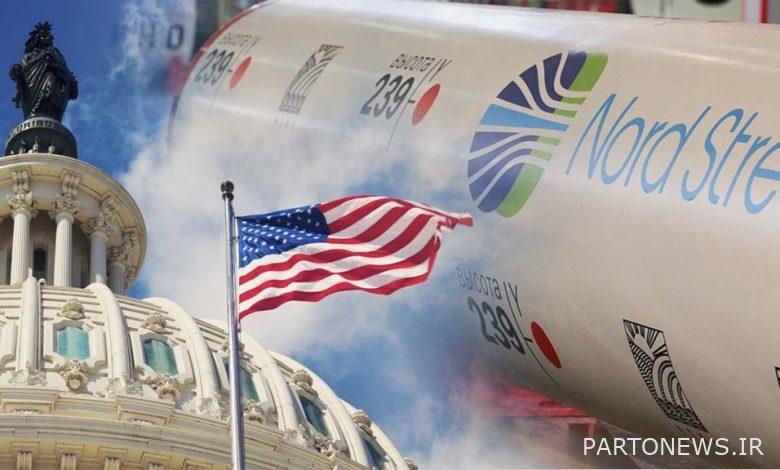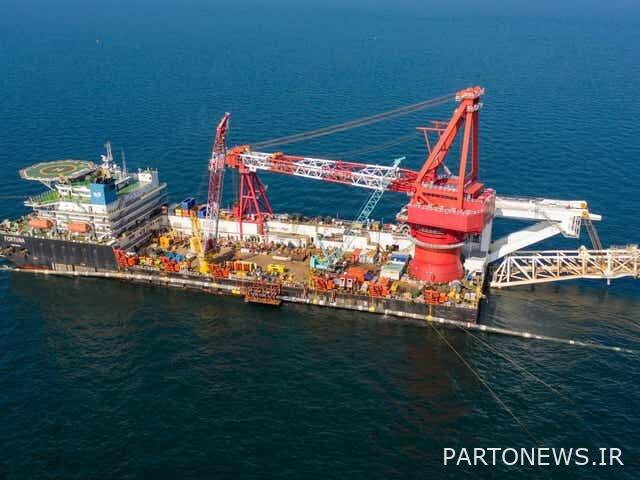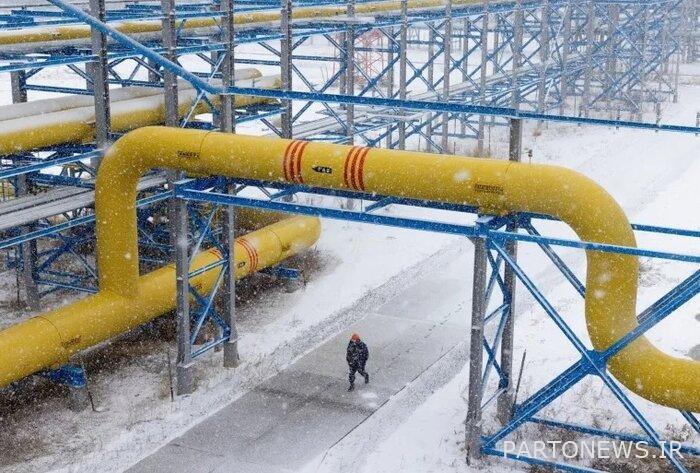Will Washington exclude Moscow from the European energy market?

Although all eyes are on Ukraine over escalating tensions between Russia and the United States and NATO, the energy pipeline project, which is intended to transport Russian gas directly to Germany via the Baltic Sea, is an integral part of the issue. Is.
The Rolling Stream 2 project in question is an $ 11 billion pipeline owned by Russia that has put Washington and some European allies in a difficult position. In fact, this project has caused divisions among European countries and has severely weakened Ukraine’s position.
The United States wants to prevent the project from being completed and activated in any way possible. In this regard, the White House is using its usual option, which is to lie to the media, and by magnifying the threat, which is very unlikely to occur, it wants to increase the tension and form a coalition of European countries. US Undersecretary of State for Political Affairs Victoria Nuland has threatened that if Russia invades Ukraine in any way, we will work with Germany to ensure that it does not make progress.
The Counter Punch website reports on the past and present status of the super-project, stating that since the 1960s, when Russian gas was first imported to Europe, Washington has seen Russian energy as a threat to its global leadership and European energy security. Recently, the United States has become the world’s largest gas producer and major exporter of LNG (liquefied natural gas), using ferrous technology. Washington is trying to replace Russian gas in the big European market, but with the completion of Rolling Stream 2, which is now awaiting German approval, this process will be seriously hampered.
Washington sees Russia’s energy capacity as a threat to its global leadership and European energy security
Shortly after construction of the pipeline began in 2018, the United States passed a law banning the Swiss ship carrying the pipeline. Switzerland withdrew from the project and was replaced by two Russian ships despite sanctions. The United States also threatened German contractors, but they continued to operate.

In 2021, when the project was nearing completion, German Chancellor Angela Merkel went to the United States and insisted on the need to roll Stream 2. President Biden somehow agreed to this because he wanted to improve relations with the most powerful country in the European Union.
Rolling Stream 2, like its Rolling Stream 1 predecessor, emerged as a joint venture (51% of Russian Gazprom, 49% of Royal Dutch Shell, as well as Austrian, French and German companies). The Polish government agency then forced the European partners and partners to relinquish their share of the issue, creating another delay. European companies gave up their share but remained in the pipeline as financial investors.
Gazprom became the sole owner of the pipeline after the transfer of European shares. It is also the world’s largest gas supplier, which has a monopoly on the gas pipeline in Russia and wants to supply gas to Europe through its pipeline. The European Union, meanwhile, has said since 2009 that pipeline operators could not own the gas they carry, in order to encourage competition in the market. Following the start of construction of the Stream 2 rolling stock, the European Union extended its rules to new offshore pipelines of foreign origin.
A challenge for Germany and the United States
Rolling Stream 2 has been delayed due to US threats and sanctions, most importantly, it is significantly challenging the US hegemonic project.
USA Today believes that during this period, Russia and the United States have once again experienced new tensions in a new form. Now they are using another weapon that is nothing but energy. Each of the two countries is using this leverage in some way and wants to pursue their own interests.
آلمان The German government is in a difficult situation because it wants to keep its most important ally, the United States, satisfied and at the same time not to harass the Russians.
The website “Active” also wrote in this regard that Germany is in a difficult situation in this crisis and has to make a decisive decision about the rolling stream project.
According to this analysis, if the tension becomes more serious, in fact, Russia, as a supplier of gas, will put Berlin in front of its security allies, which in any case will be to the detriment of Germany. “Germany is in a difficult situation,” said Marcel Dirsus, a member of the Institute for Security Policy at Kiel University. The Schultz administration wants to keep the Americans happy because they are Germany’s most important ally outside Europe, but they do not want to bother the Russians either. It’s hard to do
In any case, cutting off gas supplies from Russia would increase the risk of a gas supply crisis in Europe and increase energy prices in Europe. About 35% of the EU’s natural gas comes from Russia. Of the 167.7 billion cubic meters of European natural gas imported from Russia in 2020, Germany tops with 56.3 billion cubic meters of natural gas imported from Russia, followed by Italy with 19.7 billion and the Netherlands with 11.2 billion. Cubic meters of natural gas are in the next ranks.
Rolling Stream 2 was the only pipeline affected by political issues, and the rest of the pipelines completed before May 2019 were exempt from pressure; As a result, project completion was delayed due to US sanctions on piping. Gazprom complained of a discriminatory policy. In August 2021, a German court rejected the appeal, and Gazprom then appealed to the German Supreme Court.
German artisans are looking for Russian gas. Germany has only 17 days of gas storage. Short-term price fluctuations have added to their problems. EU gas imports are increasingly changing markets as short-term contracts are calculated on the basis of crude oil prices.
Fluctuations in the energy market
According to the US analytical news site VOX, the pipeline is Russia’s geopolitical tool for undermining Europe’s energy security and national security. Ukraine, too, has certainly understood the situation and wants the pipeline process to stop. Once Stream 2 is activated, Russia will no longer have to pay for gas transit through Ukraine. In practice, both Russia and Europe will have less need for a pipeline through Ukraine.
Germany sees Rolling Stream 2 as an essential business project for its industries and is determined to make it operational. Some European countries agree with this decision and others do not accept it or do not want to say much about it.
“The project has already offset Moscow’s costs,” Stephen Meister, head of the International Order for Democracy at the German Council on Foreign Relations, told Wax. Even if the project is not active, it has worked very well so far, because relations between the United States, Europe and Germany have been strained and the Europeans have been divided. This is a great success.
In 2020, cash prices were about half of Gazprom’s long-term contracts, but in 2021 they increased sevenfold for a variety of reasons. The economic recovery from the Corona epidemic has boosted demand for gas in Asia and Europe. On the supply side, Central European green energy sources also declined due to windless cloudy days. The closure of coal and nuclear power plants also led power companies to turn to natural gas.

European politicians blamed Russia for the high price of gas, but Gazprom said it had issued the same amounts as agreed. The company called for long-term contracts to cover huge investment costs in the gas and pipeline fields.
North Stream 2 and cut off the interests of Ukraine and Poland
Russia is an oil state and the world’s largest exporter of natural gas and the second largest oil exporter after Saudi Arabia, according to Counter Punch. On the other hand, pipelines and sea routes to the market are vital to the Moscow economy. Russia is trying to sell its oil and gas to buyers in Asia and Europe. For this reason, Rolling Stream 2 has good commercial properties and does not impose any shipping costs, making access to Moscow’s target market much shorter than before and through Ukraine.
The point is that North Stream 2 cuts off the profits of several European countries that previously benefited from the transfer of Russian gas, especially Ukraine and Poland, which are a kind of ally of Washington. Ukraine is dependent on the cost of gas transit through these pipelines, but Rolling Stream 2 cuts that funding.
While Poland and Ukraine strongly oppose North Stream 2, Germany, Austria, the Czech Republic and other countries accept the project. Because Germany has so much influence in the European Union, it sees gas energy as an alternative fuel after the phasing out of nuclear and coal fuels.
The United States seeks to escalate the crisis
The current crisis between Russia and the US-NATO has been taking shape for years. According to the report, with the dissolution of the Soviet Union, NATO expanded its membership to Eastern Europe. This military organization facilitates the process of US domination and leadership, and puts European countries side by side with Washington and Moscow. From Russia’s point of view, NATO is provocative and a threat.
Under an agreement that formed the basis of the collapse of the Soviet Union, the West guaranteed that it would not expand into Russian sphere of influence; But this commitment has recently been violated by NATO with the deployment of troops, ships and aircraft along Russia’s borders. The West accuses Russia of interfering in Ukraine. Russia also cites the 2014 coup and Western involvement in Ukraine.
In December 2021, Russia submitted a draft agreement to the United States and NATO, calling for a complete overhaul of Europe’s security structure. Russia stressed the principle of indivisible and equal security for all countries, which was agreed upon by 56 members of the Organization for Security and Cooperation in Europe (OSCE) in Istanbul (1999) and reaffirmed in Astana (2010). The members openly agreed not to strengthen their security to the detriment of the security of other members, and the United States is one of the signatories.
At a time when Ukrainian leaders are skeptical of the veracity of Washington’s statement, the United States is escalating tensions by reiterating claims of possible Russian aggression.
President Putin has warned that if the West continues its aggressive policies (NATO expansion and missile deployment in Eastern Europe), Russia will take military-technical reciprocal measures.
Several high-level meetings were held between Russia and the United States, NATO and the Organization for Security and Cooperation in Europe. On January 26, Washington issued a written response indicating that it was seeking to limit the debate to Ukraine and that Russia was ready to attack. Russia has repeatedly stated that it will not launch an attack, but will support it if the West attacks Donbass.
With Ukrainian leaders skeptical, the United States has stepped up tensions by reiterating allegations of possible Russian aggression, even threatening unprecedented sanctions against major Russian banks, high-tech commodities, Swift Financial System and Rolling Stream 2. he does.
France and Germany opposed the sanctions because of their negative impact on their economies. These countries say they are not yet convinced that Russia intends to attack unless provoked by Moscow.
On January 26, representatives of France, Germany, Russia and Ukraine reaffirmed their support for the 2015 Minskudo Agreement and the unconditional ceasefire. The agreement calls on Ukraine to negotiate autonomy with the Donbas Republic within the framework of a federal Ukraine, but so far no negotiations have taken place.
In short, the European Union imports 40 percent of its gas from Russia. For Russia, the routes through Ukraine and Poland are unreliable due to hostilities in both countries. Ukraine has a long-term contract with Gazprom for gas transit until 2024, according to which it receives an annual cost of $ 2 billion for gas transit and strongly demands its continuation. For its domestic market, however, Ukraine indirectly buys Russian gas from Poland, Romania and Slovakia.
Whatever happens with Western sanctions, Russia also has a new strategic market in China. The Power of Siberia pipeline began exporting gas from eastern Siberia to northeastern China two years ago. The two countries have agreed to build a second line. The pipeline carries gas from the Yamal Peninsula in Russia’s Arctic to northeastern China. This means that Yamal gas can easily be transported to Europe, as well as to China.
The current situation is dangerous and can easily escalate. Rolling Stream 2 is very important, but national security takes precedence over everything else. Security can only be achieved when it is global. US efforts to contain Russia and maintain control of Europe are not working. Now the world is multipolar and Rolling Stream 2 is at the center of the current crisis.

